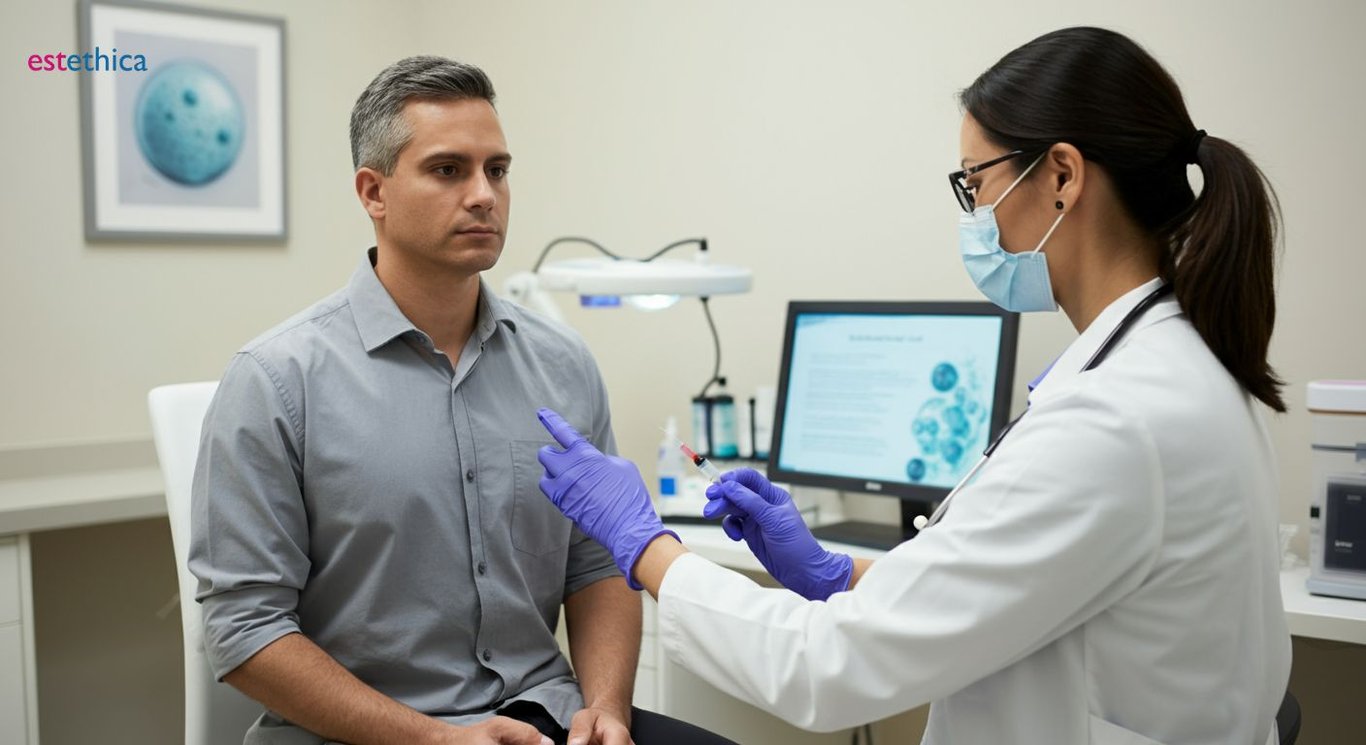Revolutionizing Cosmetic Dermatology with Stem Cell Therapy
Unlock the potential of stem cell therapy for youthful, rejuvenated skin. Explore breakthroughs and safety in cosmetic procedures.
Stem cell therapy is rapidly evolving as a promising treatment across various medical fields. Its application in skin health, particularly dermatology and cosmetic procedures, offers incredible potential for rejuvenation and repair. This blog explores the mechanisms, benefits, and future innovations of stem cell therapy in skin care.
What is Stem Cell Therapy and How Does It Work?
Understanding the Mechanism of Stem Cell Therapy
Stem cell therapy, a cornerstone of regenerative medicine, utilizes the unique properties of stem cells to repair and regenerate damaged tissues. These undifferentiated cells can transform into specialized cell types, offering a versatile approach to healing. For instance, in skin therapy, stem cells can significantly enhance skin elasticity and accelerate the healing process by promoting collagen production and skin regeneration.
Key Benefits of Stem Cell Therapy
- Accelerated healing: Stem cells can reduce recovery time by promoting tissue repair.
- Enhanced elasticity: They improve skin firmness and elasticity, reducing signs of aging.
- Collagen production: Stem cells stimulate collagen synthesis, vital for skin health.
These benefits make stem cell therapy a promising option for those seeking advanced treatment options for various conditions, including skin rejuvenation and arthritis management.
How Stem Cell Treatment Works
- Harvesting: Stem cells are collected from sources like bone marrow or adipose tissue.
- Processing: The cells are isolated and prepared for therapeutic use.
- Application: Processed stem cells are injected into the target area to promote healing.
This process highlights the precision and potential of stem cell treatment, offering a tailored approach to patient care. As research progresses, the applications of stem cell therapy continue to expand, promising new avenues for medical treatment and recovery.

Exploring the Benefits of Stem Cell Therapy for Skin Care
Innovative Applications of Stem Cell Therapy in Dermatology
Stem cell therapy is revolutionizing dermatology by offering non-invasive solutions for skin rejuvenation. Unlike traditional methods, stem cells provide a natural way to enhance skin vitality. For example, they can be used to treat sun-damaged skin, restoring its natural glow and resilience. Additionally, stem cells are effective in reducing hyperpigmentation, offering a more even skin tone.
Key Advantages of Stem Cell Therapy in Skin Care
- Non-invasive rejuvenation: Stem cells offer a natural alternative to surgical procedures.
- Improved skin tone: They help in reducing hyperpigmentation and achieving an even complexion.
- Enhanced resilience: Stem cells boost the skin's ability to recover from environmental damage.
These advantages highlight the potential of stem cell therapy to transform skin care, making it a preferred choice for those seeking effective and natural solutions.
Steps in Stem Cell Therapy for Skin Care
- Consultation: A dermatologist assesses the skin's condition and suitability for treatment.
- Preparation: Stem cells are prepared and tailored to the individual's skin needs.
- Application: The cells are applied to the skin, initiating the rejuvenation process.
This methodical approach ensures that each treatment is customized, maximizing the benefits of stem cell therapy for skin care.

Is Stem Cell Treatment Safe for Cosmetic Procedures?
Ensuring Safety in Stem Cell Cosmetic Applications
Stem cell treatment in cosmetics is gaining traction due to its potential to rejuvenate skin and enhance appearance. However, safety remains a critical concern. Rigorous studies and clinical trials are essential to evaluate the long-term effects of these treatments. Currently, many dermatological applications are deemed safe when conducted by certified professionals using approved techniques and equipment. For instance, stem cell treatments for facial rejuvenation have shown promising results without significant adverse effects.
Safety Measures in Stem Cell Cosmetic Procedures
- Professional oversight: Treatments should be administered by qualified dermatologists.
- Approved methods: Use of techniques that have undergone thorough testing.
- Quality equipment: Ensuring the use of certified and reliable tools.
These measures help mitigate risks, ensuring that patients receive safe and effective treatments. As stem cell research advances, the understanding of its safety profile continues to improve, offering more confidence in its cosmetic applications.
Steps to Ensure Safety in Stem Cell Treatments
- Research: Conduct thorough studies to understand potential risks and benefits.
- Regulation: Implement strict guidelines and standards for treatment protocols.
- Monitoring: Continuous observation of patients post-treatment to track any adverse effects.
By following these steps, the cosmetic industry can enhance the safety and efficacy of stem cell treatments, making them a reliable option for those seeking advanced skin care solutions.

Latest Innovations in Stem Cell Therapy for Dermatology
Emerging Techniques in Stem Cell Therapy
Recent advancements in stem cell therapy are revolutionizing dermatology by integrating cutting-edge technologies. One notable innovation is the combination of stem cells with nanotechnology, enhancing the precision and effectiveness of treatments. For instance, nanoparticles can be used to deliver stem cells directly to damaged skin areas, improving targeting and reducing recovery time.
Innovative Approaches in Stem Cell Dermatology
- Nanotechnology integration: Enhances delivery and efficacy of stem cell treatments.
- 3D bioprinting: Allows for the creation of skin grafts tailored to individual needs.
- Gene editing: Improves the regenerative capabilities of stem cells for better outcomes.
These innovations are paving the way for more personalized and effective dermatological treatments, offering new hope for patients with challenging skin conditions.
Steps in Advanced Stem Cell Therapy Techniques
- Research and development: Continuous exploration of new technologies and methods.
- Clinical trials: Rigorous testing to ensure safety and efficacy of new treatments.
- Implementation: Adoption of successful techniques in clinical practice.
By following these steps, the field of dermatology can continue to evolve, providing innovative solutions that enhance patient care and treatment outcomes.
Revolutionizing Skin Care with Stem Cell Therapy
Ensuring Safety and Efficacy in Stem Cell Treatments
Frequently Asked Questions
What is stem cell therapy and how does it work?
What are the benefits of stem cell therapy for skin care?
Is stem cell treatment safe for cosmetic procedures?
What are the latest innovations in stem cell therapy for dermatology?
How does the process of stem cell treatment work?
Discover the Path to Healthy Beauty with estethica's Expert Care!
📞 Call Now for a Free Consultation!